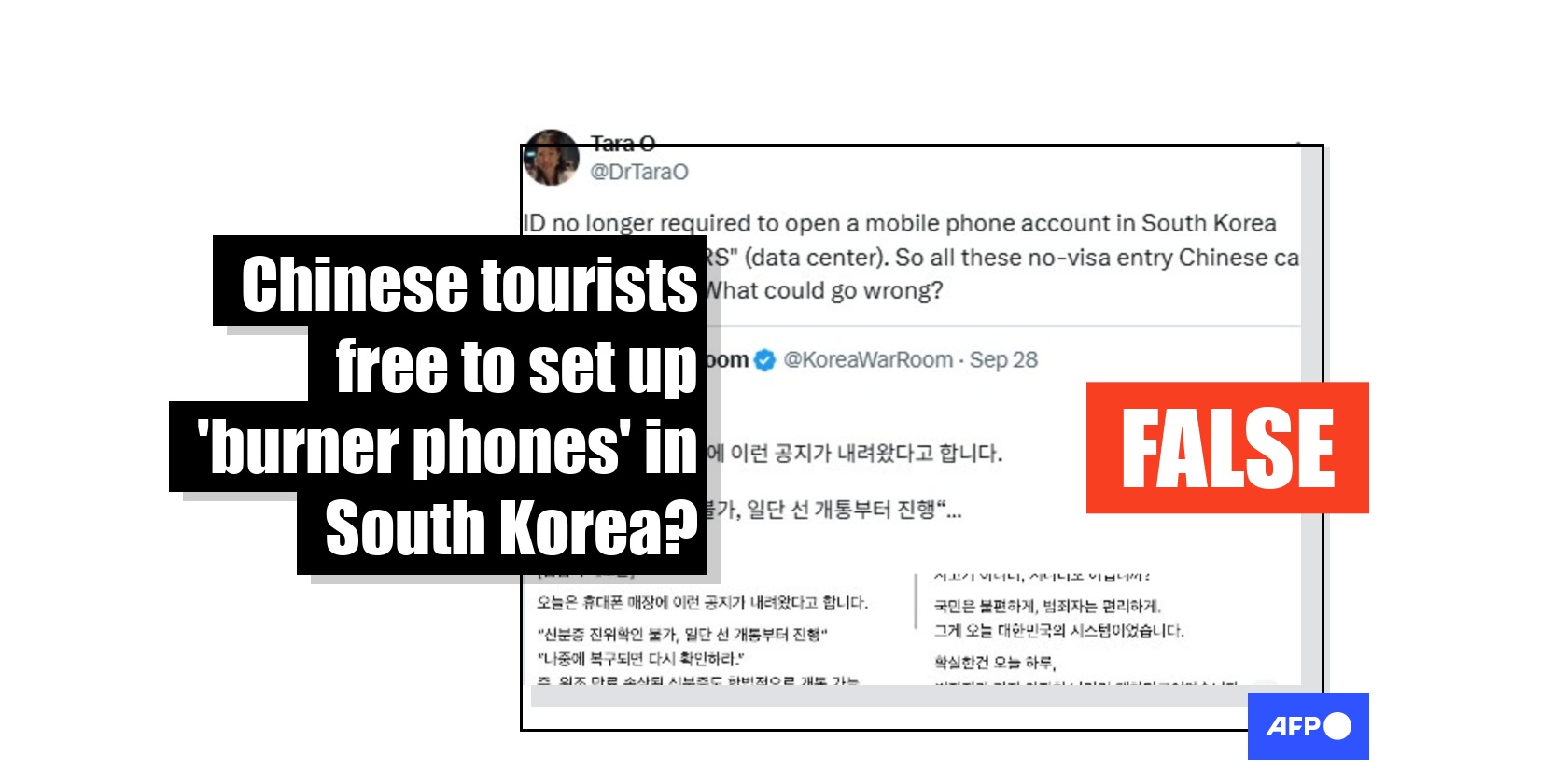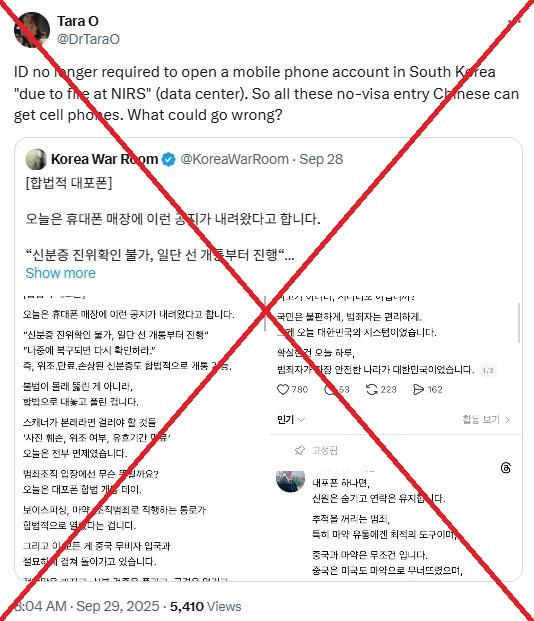
South Korean ID database outage did not overlap with Chinese tourists' visa-free entry
- Published on October 16, 2025 at 06:32
- 3 min read
- By SHIM Kyu-Seok, AFP South Korea
The public data director at South Korea's interior ministry says access to the country's national ID database was restored before a visa-free scheme for Chinese tourists came into effect, contradicting posts pushing conspiracy theories that the disruption allowed them to circumvent a ban on tourists from opening a mobile phone account. The official and the Ministry of Science and ICT say the temporary outage also did not remove a legal requirement for telecom providers to verify subscribers' national ID number or alien registration number.
The claim was shared in an October 11 X post by US-based activist Tara O, who has previously spread conspiratorial claims about supposed Chinese political influence in South Korea.
Her post reads: "ID no longer required to open a mobile phone account in South Korea 'due to fire at NIRS' (data center). So all these no-visa entry Chinese can get cell phones. What could go wrong?"
O's post quotes another X post alleging that, because ID verification systems were down, mobile shops received notices to "activate phones first and verify later," effectively allowing "forged, expired or damaged IDs" to be used legally.
The quoted post described it as "legal burner-phone day" and claimed it conveniently coincided with the start of a visa-free entry scheme for Chinese tourists (archived link).

South Korea has seen a spike in anti-China sentiment since former president Yoon Suk Yeol's failed declaration of martial law and subsequent impeachment (archived link). AFP has debunked other posts falsely claiming Chinese tourists could enter the country without any immigration requirements.
Claims alleging that the data center outage allowed visa-free Chinese tourists to create "burner phones" for illegal activities such as drug sales also appeared on Threads and Facebook.
They circulated after the September 26 fire at the National Information Resources Service (NIRS) in Daejeon disrupted parts of South Korea’s government data network, including access to the national ID database (archived link).
Under the Telecommunications Business Act, South Korean mobile subscribers must verify their identity using an official document such as a resident registration card, driver’s licence, passport, or alien registration card when signing a telecom contract (archived link).
This real-name verification system was introduced to curb fraud and phone-based crimes, ensuring that each mobile account is tied to a verifiable identity.
Short-term visitors and visa-free tourists can use prepaid SIM cards but cannot open mobile phone accounts, as only residents with a valid Alien Registration Card are eligible (archived link).
The Chosun Ilbo reported that roughly 150,000 mobile phone accounts were activated without full ID verification following the NIRS fire before the system was restored, citing data submitted to an opposition lawmaker by telecom companies (archived link).
System restored
But the Interior Ministry's public data director Bae Il-gwon told AFP the disruption was brief and fully restored by September 29 -- the same day the visa-free entry programme for Chinese group tourists began.
"There are no problems now. The system was restored on the 29th," Bae said on October 13, adding that during the downtime, mobile stores still performed identity checks.
"There are several ways to verify identity. Stores continued the normal verification process, but they temporarily couldn’t cross-check if an ID was genuine through the government database -- that part was done later once the system came back online," he said.
According to both Bae and the Ministry of Science and ICT, the NIRS outage did not remove the legal requirement for verification.
Spokespeople from South Korea's three major telecom companies -- SK Telecom, KT and LG U+ -- told AFP, "the process was temporarily switched to an 'activate first, verify later' procedure until the system was fully restored".
One of them added that "from October 1, we completed sequential post-verification procedures, and most accounts were found to belong to legitimate subscribers" and that "for the few cases that did not match, we plan to reverify or cancel plans immediately."
Cases of so-called "burner phones" in South Korea typically involve brokers misusing registered foreigners' IDs — a problem that predates both the NIRS fire and the visa-free policy (archived link).
Copyright © AFP 2017-2026. Any commercial use of this content requires a subscription. Click here to find out more.
Is there content that you would like AFP to fact-check? Get in touch.
Contact us
